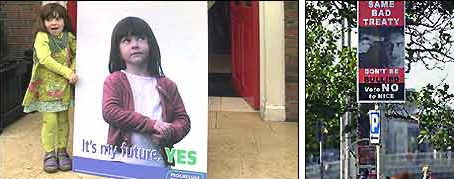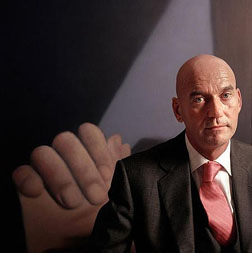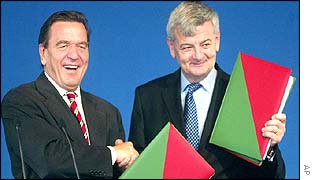|
Ireland ratifies the Nice Treaty (2002) - Britain votes to leave the EU (2016) See below |
||
|
|
|
|
Europe's doors are closing Since the Hebrew exodus, immigrants have always fled persecution and adversity in search of providence. Just as always, new arrivals are met with suspicion or outright hostility by the ones already there. Perhaps it is political scape-goating: Who are better to take the blame for a society's festering ills (i.e., crime and unemployment) than the least enfranchised in its midst? Perhaps it is the fear that the identity of a successful nation – its storied cultural heritage, enlightened civic policy and affluent lifestyle – is not to be enhanced or shared, but fought over and taken away. Perhaps it's simply the tribal instinct of not trusting foreigners. Whatever it is, enough noise has been made about it of late by the European political right to raise its profile as an outstanding issue, if not a crisis. |
||
|
Perhaps it is the fear that the identity of a successful nation – its storied cultural heritage, enlightened civic policy and affluent lifestyle – is not to be enhanced or shared, but fought over and taken away. |
In France, a once-lethargic electorate quickly abandoned its indifference when National Front presidential candidate Jean-Marie Le Pen, pressing for the denial of citizenship and welfare benefits even to children born in France to one immigrant parent, consistently won 18% of the nation's vote during the first and second rounds of balloting. In Austria, Italy, Denmark and Norway, rightist political parties with anti-immigration platforms are already occupying seats of power. | |
|
There are millions of non-natives throughout Europe at any given moment: permanent residents of Turkish and North African descent on the Continent, South Asians in Britain, plus itinerant professionals, laborers, students and tourists from all over the globe. I myself am among them, twelve days or so each year. I do not expect any turn for the worse upon my next arrival, but then again, I am wary that I will never outstay my welcome, when even my briefest presence will be set to a jarring contrast against those who may be denied the wish to stay for much longer. Charles Weng, 7 May 2002 UPDATES Sweden, 17 September 2002: In Sweden, the ruling Social Democrats have won the general election in September, thereby preserving the prosperous nation's generous health and education benefits. However, this apparent left-of-center mandate no longer encompasses a liberal immigration policy. With the moderate Liberal party also winning seats in the Parliament, the new government is likely to enforce two following rules: (1) New immigrants will be repatriated if they do not find legitimate work within three months of arrival; and (2) Prospective citizens must pass a Swedish language test. |
||
|
German Chancellor Gerhard Schroeder of the Social Democratic Party with Foreign Minister Joschka Fischer of the Green Party, signing the so-called red-green coalition agreement. (AP photo) |
Germany, 23 September 2002: With only a margin of 9 seats in the Bundestag, Gerhard Schroeder's Social Democrats narrowly won the general election, mirroring the success in Sweden a week earlier. Its coalition with the Greens would also nominally assure the preservation of the welfare state, despite the shrinking tax revenues due to a 10% unemployment rate, and the impending costs for infrastructure repair following the devastating floods in eastern Germany. Immigration was not a major issue as predicted by the pundits earlier this year; it was overshadowed by the floods and Schroeder's refusal to join the United States in an attack against Iraq. However, to tackle with the problem of unemployment, both the left and the right hinted labor reforms that may make Germany a better place for foreign skilled workers. |
|
|
The Netherlands, 16 October 2002: The fledgling "Pim Fortuyn's List" party (LPF), left in disarray after the murder of their founder, imploded in just three months following their electoral success. As their two feuding cabinet ministers resigned, they took the entire coalition government -- the majority Christian Democrats and the conservative VVF -- with them, prompting a new election next January at the latest. Although the LPF banner is surely doomed, the anti-immigration platform that once handed them 26 out of 150 parliamentary seats is still very much alive, readily adopted by the other parties. It probably isn't a real concern, but some do wonder how the interim government or the one that follows it would honor the Dutch's prior commitments to the European Union, especially regarding its eastward expansion by 2004 (see below). |
||
| Ireland ratifies the Nice Treaty | ||
| Eire, 20 October 2002: The 2000 Nice Treaty, inviting ten European Union applicants (Estonia, Latvia, Lithuania, Poland, Czech Republic, Slovakia, Hungary, Slovenia, Malta and Cyprus, but not Turkey) to become full members by 2004, must be ratified by all existing members. While the parliaments of fourteen nations passed the measure, Ireland was constitutionally obliged to leave it to a national referendum, which narrowly rejected it in June 2001. |  (BBC
photo) (BBC
photo) |
|
| Indeed, it is
uniquely historic for a single nation's electorate to have such a direct
authority -- twice -- over so many other
countries on a specific yet wide-reaching issue. This time, the Irish
voters confirmed the year for an EU
expansion gala come 2004.
No matter how they voted, all people in Ireland are concerned that their military neutrality -- in effect since independence from Britain -- might be compromised by so many new voices in Brussels. This has become a poignant issue in light of Britain's disposition to join the United States in a possible invasion of Iraq, a move that is highly unpopular here. The majority now believe their pro-Europe referendum would give them more clout in an expanded union to preserve this vital interest. However, because the EU has yet to be a military bloc à la NATO, economics remains the the heart of the matter. One contention against EU expansion argues that the few jobs in Western Europe's already-tight labor market would be lost to the Eastern Europeans, who would either accept lower wages for their lower costs of living back home, or move West to vie for the better pay and benefits there. The counter-argument is that both the East and the West stand to prosper from a larger, freer market of goods, services and ideas. Ireland, now a wealthy nation by any standard, certainly benefited greatly from the business incentives and lower trade barriers within the EU, enabling the economy of Emerald Isle to undergo the dramatic transition from an agrarian exporter to a nerve centre of high technology and information services within three decades. Inevitably, with the infusion of foreign workers in the tech sector, Irish society is also becoming more diverse -- and less cohesive. Both sides of the referendum do see the ever-increasing social pressures created by a greater integration of East and West, as demonstrated for the past two decades by the reunification of Germany. If the Europeans must compete ever harder amongst themselves for their livelihood, imagine the predicament of non-natives coming to the Continent. 2016 update: 'Tis a Summer of Britain's Discontent (Britain votes to leave the EU) 2016 update: Rules, Brittania! (PM Theresa May forms the first post-Brexit government) |
||
| Back to top TITLE PAGE INDEX CONNECTIONS WHY NOT TURKEY? | ||

